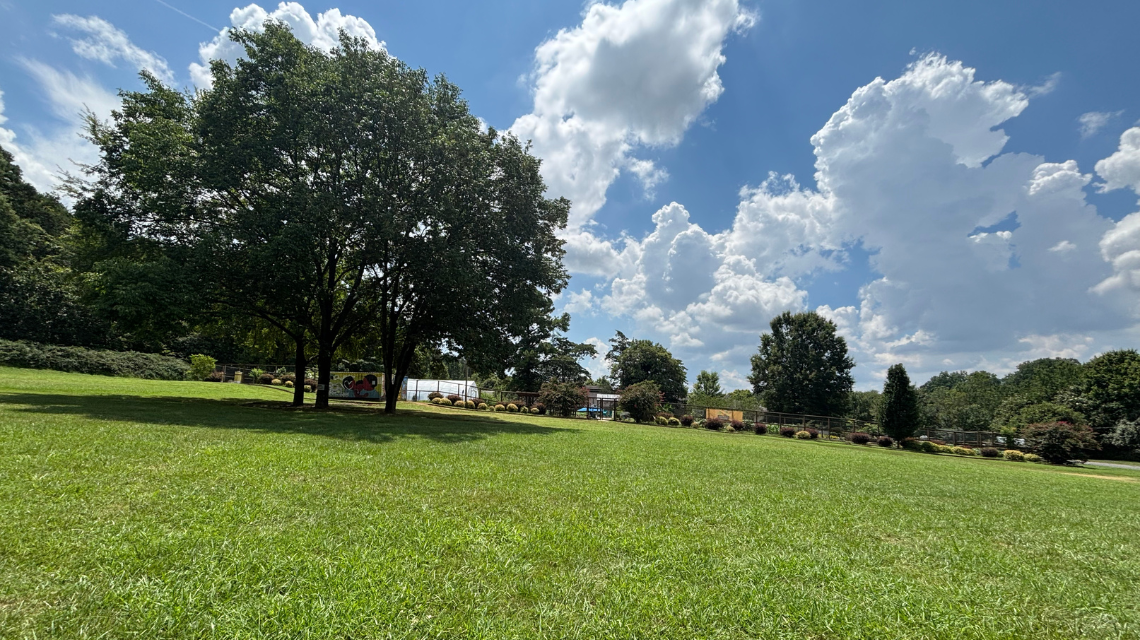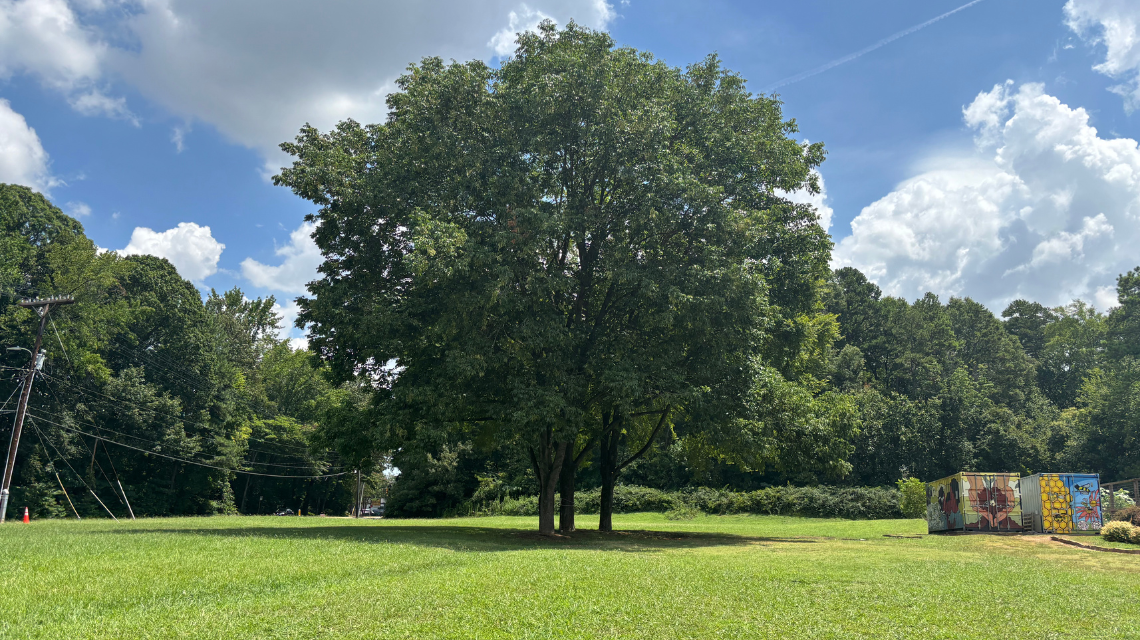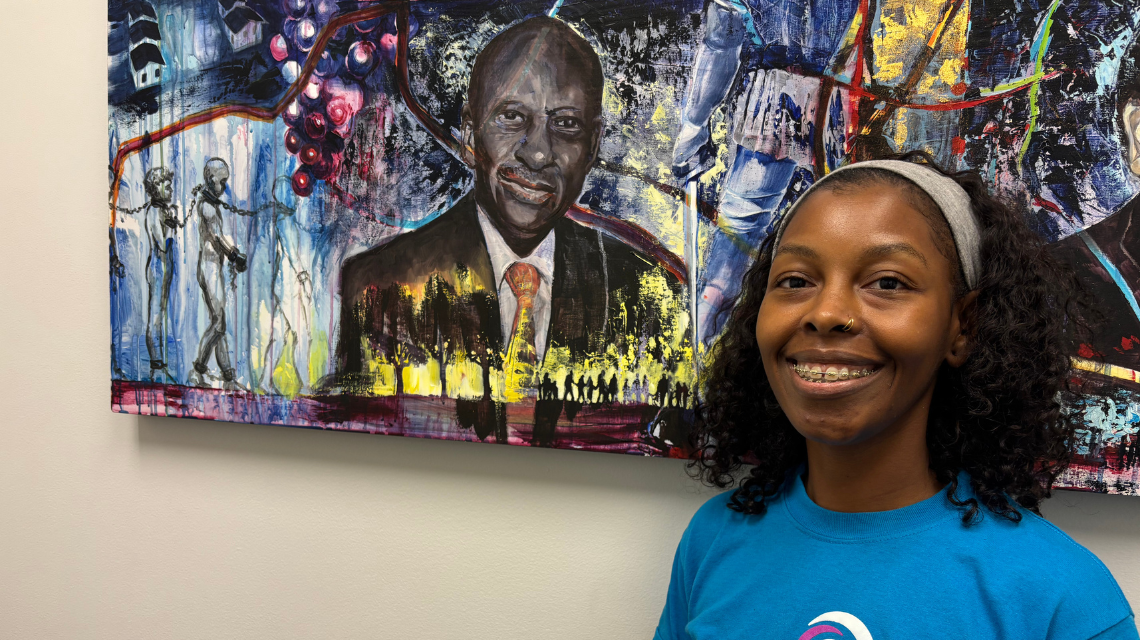"We knew we had to build it": The Story of the Three Sisters Market
Published on August 19, 2025

The land where the Three Sisters Market will sit.
By Morgan Newell
Rickey Hall grew up in the West Boulevard corridor. He remembers the stores that used to sit on every corner, the neighborhoods and neighbors that looked out for each other and the schools that helped shaped him including Amay James Elementary school, an all-Black school between Clanton Road and Tyvola Roads.
“We had inferior books, but we did not have inferior minds,” he said.
Decades later the landscape around West Boulevard has changed, Hall’s commitment to his community has not. Today he is one of the leaders determined to ensure that West Boulevard families have access to the same resource that many Charlotteans take for granted, a neighborhood grocery store.
“We live in a food desert, and we have been trying to get a grocery store in this area for years,” he said.
Food deserts are areas where residents do not have access to affordable, healthy food options, especially fruits and vegetables. This is caused by a lack of grocery stores within the area. While the City of Charlotte is actively working on building a reliable mobility system by improving roads and bus and transit systems for all residents, limited access to transportation remains a significant hurdle in these locations.
Hall has been on the frontlines of the fight to change West Boulevard’s food desert status for decades, it hasn’t been easy. In 1989, community members tried to convince several big box supermarkets to invest in the area. Hall said residents conducted a study to show how well a grocery store would work in the growing area. He recalled a few promises being made and a lot of potential, but in the end, there was no store.
“Nobody would bite,” Hall said. “We didn’t understand why, because we had the proof the grocery store would work.”
Fast forward 11 years to when INLIVIAN, a nonprofit committed to creating affordable housing solutions in Charlotte, brought the Arbor Glen neighborhood to life. The over 300-unit development is located between Clanton Road and West Boulevard. The new complex started a renewed call for a grocery store.
Hall said residents knew more housing meant more people, which could only help their case for a grocery store. The community conducted another study, stated their case before the supermarkets, and hoped for the best. The outcome remained the same—no grocery store in the area.
“If you try two times and it’s not successful, then you need to reach the conclusion that they are not coming,” he said. After those two unsuccessful attempts, Hall said residents knew exactly what they had to do.
“We knew we had to build it,” he said.
That was the moment the first seed of a market co-op was planted.
The Concept of a Co-op
With the concept of a grocery store being sowed, the West Blvd Neighborhood Coalition, residents and city and county leaders discussed how a new marketplace would work. The idea of a cooperative, or co-op, was discussed and decided on.
A co-op is a business owned and controlled by its members. In this case, the members are the people living in the community who are also its customers. You become a member by purchasing a share, or a stake in the market. Co-ops are completely independent, and because they are owned by their members, those members get to make the decisions. Hall said a co-op will be committed to meeting the needs of residents in the corridor and keeping the market community centered.
“It gives the people a voice,” he said.

The Three Sisters Market sign on West Blvd.
In 2024, building on years of community-driven groundwork, the City of Charlotte joined other partners including Mecklenburg County to help move the vision to reality. The city committed $1.5 million, Environmental Review services and staff assistance to West Blvd Neighborhood Coalition to support market construction. While these investments provided important support, the heart of the project remains community-driven with most of the funding designed to come from membership, so ownership and decision-making remain in the hands of residents.
Hall also said the main function of the co-op is offering fresh food to help a growing community that needs it. Food insecurity can negatively impact people’s health and well-being if not addressed. In food deserts, what you eat is limited to what you have access to. You might find stores and restaurants offering more processed food, like soda and chips or fast food, which isn’t considered the healthiest option. While these products are not bad overall, they can become a detriment to your health if eaten often. However, without many other options, such as fresh produce, it may be difficult to maintain a healthy, balanced diet.
“People in this area should have access to fresh fruits, veggies, and food,” Hall said.
Fresh food is a driving force for Hall. He knows it means a healthier community that can continue to prosper even more. The marketplace will be a huge factor in that. With a plan in place to open one, now residents need a name. The one they would come up with was rooted in such a rich history, the store couldn’t be called anything else.
All in the Name
Three trees stand tall and intertwined in the middle of the land dedicated for West Boulevard’s new co-op: Three Sisters Market. Each tree is symbolic of one of the three strong, community-driven women the co-op is named after.

The three trees on the property that the three sisters are named after.
Amay Martin James, Luciel McNeil and Dorothy Waddy are the three influential women who Hall says deserve this recognition. It’s because of the work they put in to helping the West Boulevard community.
Amay Martin James was a dedicated educator and a woman of faith. She started a Sunday service at James Street and created the Amay James Church, the first presbyterian African American church recognized by Mecklenburg County. That church was the heartbeat of West Boulevard area when Hall was growing up. Hall says James was a powerhouse in the community, as both a teacher and a church leader. Her legacy is rooted in the Amay James Elementary School and Amay James Recreation Center.
Luciel McNeill was another strong voice for change for West Boulevard. Local residents credited McNeill “putting West Boulevard on the map” by bringing up issues within the neighborhood and getting the City of Charlotte to pay attention. Her advocacy stretched across multiple avenues surrounding social and economic justice. She pushed for a recreation center, housing, worker rights and the West Boulevard Library. She ran as a candidate for city council and was a huge factor in the creation of the West Blvd Neighborhood Coalition. Her legacy continues with senior nutrition and children’s programs, utility and street improvements, a recreation center and a park.
Dorothy Waddy wasn’t born here, but she moved to and raised her family in Clanton Park. She joined Friendship Missionary Baptist Church and taught Sunday School there. She later became department superintendent then superintendent. There wasn’t a political or community cause Waddy didn’t tirelessly campaign for. She took over the West Blvd Neighborhood Coalition and helped it secure its nonprofit status.
“They were catalysts of change and pushed for it to make sure this community was a place people were proud to live in,” Hall said.
The culture of community self-help existed for years largely because of the work of these three women. So naturally, Hall said dedicating this community-owned market to the three who made such an impact on said community wasn’t even a question. While they aren’t sisters in real life, they are now forever etched in the co-op’s legacy as sisters who stood resolute in their commitment to making the West Boulevard corridor a better place.
Membership Matters
The Stratford Richardson YMCA is just one of the buildings close to the Three Sisters Market. Outside of the building, a sign advertising the food co-op sticks up high above the blades of grass. The tiny billboard encourages anyone walking through the doors of the Y to sign up to be a member of the market.
Inside the same YMCA, Shawnice Stratford works as a branch and volunteer admin. As her last name suggests, she is the great-granddaughter of Willie J. Stratford Sr. As a fifth generation Charlottean with deep roots in the West Boulevard area, joining the co-op as a member mattered.
“My great-grandfather did so much, and I am just trying to follow in his footsteps,” Stratford said.
After a lunch and learn with the West Blvd Neighborhood Coalition, Stratford found herself at a celebratory event honoring the Three Sisters a few days later. Between visiting vendors, listening to panels which included comedian Chico Bean and touring the Seeds for Change gardens, Stratford fell in love with the idea of a co-op and signed up to be a member.
“I spend $100 at Sephora easy, and I don’t even need something like that,” she said. “So, this was an easy investment.”
When she invested in the market, she didn’t expect be treated to new insights into the rich history of her family. The membership offered her the opportunity to learn more about her great-grandfather’s service to local organizations like the YMCA, Boys Scouts of America, Charlotte Chamber of Commerce and many more. She heard directly from community members who knew the man connected to the service. In this membership, she feels more of a personal connection to her great-grandfather.
“I am just trying to move the legacy forward and learn while doing so,” she said.

Shawnice Stratford, the great-granddaughter of Willie J. Stratford and a member-owner of the co-op.
Stratford also wanted to plant a seed for a community she feels connected to. She shared how important eating healthy is for her and her lifestyle and said that access to good, quality food is important to her. She recognized that at her job at the YMCA, she could tell people to eat healthy all day, but eating healthier didn’t always come down to wanting to. Rather, it was often about being able to. The co-op market changes that in her mind. Currently, she advocates for the co-op by convincing others to make the membership commitment.
“It is a seed in a vision I can certainly get behind,” she said. “The investment is one hundred percent worth it, and it is something that truly benefits me and everyone in Charlotte.”
Today more than 400 residents have already joined the effort as members of the Three Sisters Market. However, many more are needed for the market to succeed. The membership is $100 for stake in the grocery co-op. Groundbreaking is planned for this fall, and Hall hopes to see membership double before the doors open.
For Hall, Stratford and many others the market is more than a store; it’s a testament to decades of perseverance, the legacies of James, McNeil and Waddy and to the belief that West Boulevard deserves the same access to healthy food as every other Charlotte neighborhood.
“If they can build homes, churches, and parks, Hall said, “then we can build a grocery store,”
Learn more or make your investment in healthy food and the West Boulevard corridor by becoming a member, at threesistersmarket.coop.